英语委婉语的例子30个
美国教师常用的英语委婉语
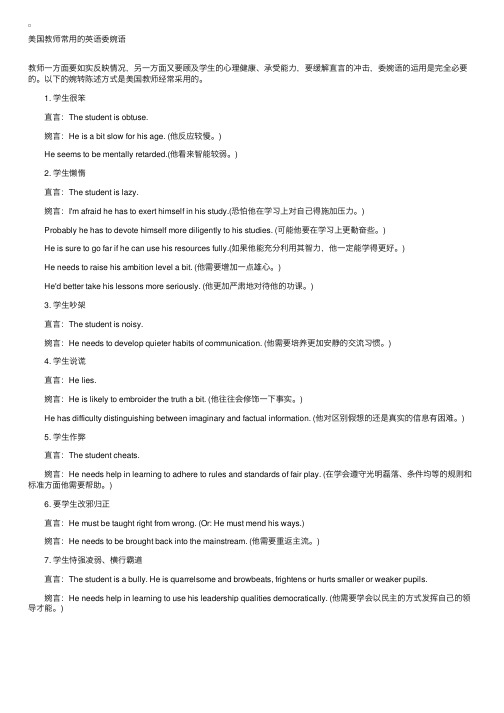
美国教师常⽤的英语委婉语教师⼀⽅⾯要如实反映情况,另⼀⽅⾯⼜要顾及学⽣的⼼理健康、承受能⼒,要缓解直⾔的冲击,委婉语的运⽤是完全必要的。
以下的婉转陈述⽅式是美国教师经常采⽤的。
1. 学⽣很笨 直⾔:The student is obtuse. 婉⾔:He is a bit slow for his age. (他反应较慢。
) He seems to be mentally retarded.(他看来智能较弱。
) 2. 学⽣懒惰 直⾔:The student is lazy. 婉⾔:I'm afraid he has to exert himself in his study.(恐怕他在学习上对⾃⼰得施加压⼒。
) Probably he has to devote himself more diligently to his studies. (可能他要在学习上更勤奋些。
) He is sure to go far if he can use his resources fully.(如果他能充分利⽤其智⼒,他⼀定能学得更好。
) He needs to raise his ambition level a bit. (他需要增加⼀点雄⼼。
) He'd better take his lessons more seriously. (他更加严肃地对待他的功课。
) 3. 学⽣吵架 直⾔:The student is noisy. 婉⾔:He needs to develop quieter habits of communication. (他需要培养更加安静的交流习惯。
) 4. 学⽣说谎 直⾔:He lies. 婉⾔:He is likely to embroider the truth a bit. (他往往会修饰⼀下事实。
) He has difficulty distinguishing between imaginary and factual information. (他对区别假想的还是真实的信息有困难。
英语对话中常用委婉表达句子
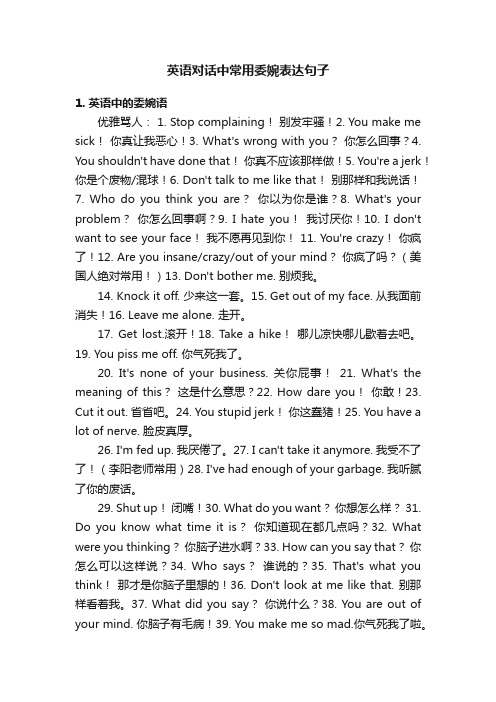
英语对话中常用委婉表达句子1. 英语中的委婉语优雅骂人: 1. Stop complaining!别发牢骚!2. You make me sick!你真让我恶心!3. What's wrong with you?你怎么回事?4. You shouldn't have done that!你真不应该那样做!5. You're a jerk!你是个废物/混球!6. Don't talk to me like that!别那样和我说话!7. Who do you think you are?你以为你是谁?8. What's your problem?你怎么回事啊?9. I hate you!我讨厌你!10. I don't want to see your face!我不愿再见到你! 11. You're crazy!你疯了!12. Are you insane/crazy/out of your mind?你疯了吗?(美国人绝对常用!)13. Don't bother me. 别烦我。
14. Knock it off. 少来这一套。
15. Get out of my face. 从我面前消失!16. Leave me alone. 走开。
17. Get lost.滚开!18. Take a hike!哪儿凉快哪儿歇着去吧。
19. You piss me off. 你气死我了。
20. It's none of your business. 关你屁事!21. What's the meaning of this?这是什么意思?22. How dare you!你敢!23. Cut it out. 省省吧。
24. You stupid jerk!你这蠢猪!25. You have a lot of nerve. 脸皮真厚。
26. I'm fed up. 我厌倦了。
英语委婉语气表达法

气,尤其在口语中。
现将常见的表达方法荟萃如下:一、用“Will you...?”提出请求等(1) Will you (please) lend me some writing paper? 请借给我一些信纸好吗?(2) Won’t you sit down and have some whisky? 要不要坐下来喝点儿威士忌?二、用would开头的句式提出请求1. Would you (please/kindly)... ?(1) I didn’t quite catch your name. Would you spell it, please? 我没听清你的名字,请拼一下好吗?(2) Would you kindly drive me home?你能不能开车送我回家?2. Would it be possible /too much (for me)to...?(1) Would it be possible for me to take three days off next month? 我可不可以在下个月请三天假?(2) Would it be too much to ask you to look after my baby for a moment? 你可以帮我看一会儿孩子吗?3. Would you be kind/good enough to /so kind as to...?(1) Would you be kind/good enough to meet us at the port? 麻烦你到机场接我们好吗?(2) Would you be so kind as to keep me informed? 请随时告诉我一些情况好吗?4. Would you mind (my) doing...?Would you mind my turning down the volume of the television? 你不介意我把电视声音关小点儿吧?5. Would you mind if I ...?Would you mind if I asked you a question? 我可以问你一个问题吗?三、shall用于第一人称和第三人称,构成疑问句,提出建议或征求对方意见(1) Shall we go to the concert tonight? 我们今晚去听音乐会好吗?(2) Shall she come at once? 要她马上来吗?四、用would, should, could, might表示看法、提出建议或忠告等(1) It would seem that something is wrong with the truck. 看来这部卡车出毛病了。
英语中的委婉语

(1)Death(死亡)to be asleep in the Arms of God (本义)安睡在上帝的怀中to be at peace (本义)平静了to be at rest (本义)在休息(2)灰色职业shoe maker 补鞋匠→shoe rebuilder 重整鞋者dish washer 洗盘子的人→utensil maintenance 器皿保全工garbage man 清扫垃圾的人→sanitation engineer 清洁工程师butcher 屠夫→meat technologist 肉类技术专家hair-dresser 理发师→cosmetologist 美容师undertaker 承办丧事的人→funeral director 殡仪负责人prostitute 妓女→pavement princess 马路天使maid/ housekeeper (女仆/ 女管家) →domestic help / day-help 家务助手,day-help 白天帮工,live- in help 住家帮手optician (眼镜商) →vision engineer (视力工程师bedding manufacturer (床具制造商)→mattress engineer (床垫工程师) 或sleep engineer (睡眠工程师)School principal ( 中小学校长)→educational engineer ( 教育工程师) (3)上厕所natural necessity (本义)自然的需要nature stop (本义)自然需要停车to pluck a rose (本义)摘朵玫瑰powder one's nose (本义)搽点粉to relieve oneself (本义)轻松一下to wash one's hands (本义)洗洗手(4)厕所powder room(化妆室)、convenience(方便去处)、cloakroom(存衣室)、loo(=waterloo, 滑铁卢)、(5)uglyhomely 不好看plain 平常plain-looking 长相一般ordinary looking 长相一般(6)fat:heavyset 敦实的,富态chubby 丰满的plump丰满的, 圆胖的stout 壮实的(7)thin:slender 苗条的svelte 亭亭玉立的,身材细长的lean 精干的lithe 敏捷的,轻快的(8)她怀孕了A hole out in one (本义) 一击入洞An accident (本义) 事故Awkward (本义) 行动不便的eating for two(本义)吃双份饭to have one watermelon on the vine(本义)藤上有瓜了to have one on the way (本义)有人要来to spoil a woman's shape(本义)坏了女子体型(9)未婚先育She is in trouble.她碰到麻烦。
英语委婉语的例子经典

英语委婉语的例子经典1. "I'm afraid that won't be possible." (我恐怕这不太可能。
)2. "Perhaps we could explore some other options." (或许我们可以考虑其他的选择。
)3. "I'm sorry, but that's not quite what I had in mind." (很抱歉,但那不是我想要的。
)4. "I'm not sure that's the best approach." (我不确定那是最好的方式。
)5. "It sounds like we have some differences in opinion." (听起来我们在看法上有些不同。
)6. "I appreciate your input, but I'll need some more time to consider it." (感谢你的建议,但我需要更多时间来考虑它。
)7. "It's not that I don't trust you, but I prefer to err on the side of caution." (不是我不信任你,但我更倾向于谨慎小心。
)8. "I'm sorry, but I'm going to have to decline your invitation." (很抱歉,但我必须拒绝你的邀请。
)9. "I'd love to help, but I'm afraid I'm not available right now." (我很想帮忙,但我恐怕现在没有时间。
中英文委婉语
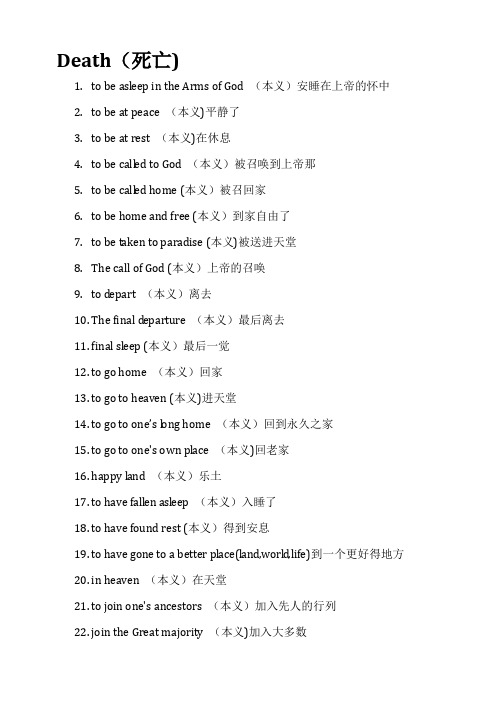
Death(死亡)1.to be asleep in the Arms of God (本义)安睡在上帝的怀中2.to be at peace (本义)平静了3.to be at rest (本义)在休息4.to be called to God (本义)被召唤到上帝那5.to be called home (本义)被召回家6.to be home and free (本义)到家自由了7.to be taken to paradise (本义)被送进天堂8.The call of God (本义)上帝的召唤9.to depart (本义)离去10.The final departure (本义)最后离去11.final sleep (本义)最后一觉12.to go home (本义)回家13.to go to heaven (本义)进天堂14.to go to one’s long home (本义)回到永久之家15.to go to one's own place (本义)回老家16.happy land (本义)乐土17.to have fallen asleep (本义)入睡了18.to have found rest (本义)得到安息19.to have gone to a better place(land,world,life)到一个更好得地方20.in heaven (本义)在天堂21.to join one's ancestors (本义)加入先人的行列22.join the Great majority (本义)加入大多数23.to leave this world (本义)离开今世24.to pay one's fee (本义)付费25.to rest (本义)休息26.to rest in peace (本义)安息27.to return to dust (本义)归之尘土28.to sleep (本义)长眠29.with God (本义)和上帝在一起30.with their Father (本义)与圣父在一起31.to fall (本义)倒下了32.to do one’s bit (本义)尽职了33.to lay down one’s life (本义)放下自己的生命34.to be no longer with us (本义)不再与我们在一起了35.to be out of pain (本义)摆脱痛苦36.to breathe one’s last (本义)呼了最后一口气37.to cancel one’s account (本义)销帐38.pay one’s last debt (本义)付最后一笔债39.kick the bucket 翘辫子40.pop off (the hooks) 翘辫子41.get off the hooks 脱身了42.to fade away (本义)消失43.to make one’s exit (本义)退场44.to kick off (本义)开球45.to be free (本义)解脱了46.to be gone (本义)去了47.to be no more (本义)不复存在48.to cl ose one’s eyes (本义)瞑目49.to come to an end (本义)结束50.to go beyond (本义)到远方去51.to expire (本义)呼气52.to go off (本义)离去53.to go one’s last (本义)走到自己的终点54.to go one’s place (本义)回老家55.to go to one’s resting place (本义)到休息地去56.to go to west (本义)西去57.to kick the bucket (本义)踢翻水桶58.to lose one’s life (本义)失去了生命59.to pass away (本义)离去60.to stop living (本义)停止生存61.to take one’s rest (本义)休息62.to shut up the shop (本义)关门Sex 性1.sleep 睡觉,上床2.love,make love 做爱3.lover 有肉体关系的爱人4.experience lover 有性经历的人5.treat off a piece of shirt /treat off a hung of shirt 睡了某人6.go all the way 允许做一切7.He did her wrong。
英语委婉语气表达法
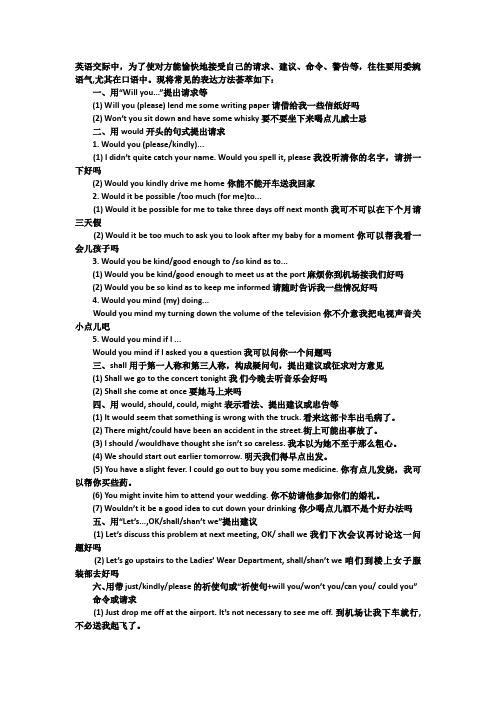
英语交际中,为了使对方能愉快地接受自己的请求、建议、命令、警告等,往往要用委婉语气,尤其在口语中。
现将常见的表达方法荟萃如下:一、用“Will you...”提出请求等(1) Will you (please) lend me some writing paper 请借给我一些信纸好吗(2) Won’t you sit down and have some whisky 要不要坐下来喝点儿威士忌二、用would开头的句式提出请求1. Would you (please/kindly)...(1) I didn’t quite catch your name. Would you spell it, please 我没听清你的名字,请拼一下好吗(2) Would you kindly drive me home你能不能开车送我回家2. Would it be possible /too much (for me)to...(1) Would it be possible for me to take three days off next month 我可不可以在下个月请三天假(2) Would it be too much to ask you to look after my baby for a moment 你可以帮我看一会儿孩子吗3. Would you be kind/good enough to /so kind as to...(1) Would you be kind/good enough to meet us at the port 麻烦你到机场接我们好吗(2) Would you be so kind as to keep me informed 请随时告诉我一些情况好吗4. Would you mind (my) doing...Would you mind my turning down the volume of the television 你不介意我把电视声音关小点儿吧5. Would you mind if I ...Would you mind if I asked you a question 我可以问你一个问题吗三、shall用于第一人称和第三人称,构成疑问句,提出建议或征求对方意见(1) Shall we go to the concert tonight 我们今晚去听音乐会好吗(2) Shall she come at once 要她马上来吗四、用would, should, could, might表示看法、提出建议或忠告等(1) It would seem that something is wrong with the truck. 看来这部卡车出毛病了。
日常英语表达委婉语(euphemism)

英语陷阱(1)He is a bicycle doctor.他是单车修理工.------------------------此句不能译作:"他是个骑单车的医生",因句中的doctor是委婉语(euphemism),是对某种职业的美称,故不作"医生"解,而是表示repair man的涵义.委婉语起源于远古,维多利来女王时代中期为其鼎盛时期,在现代英语中,其出现频率依然颇高,因为人们通过委婉语,可以用温顺悦耳的词语去谈论或叙述一些原来令人不快或逆耳之事物.为此,他们用domestic help,day help或live-in help代替mail或servant(佣人); 以custodian或superintendent替代doorkeeper,caretaker或janitor(看门人或管理人);用She has a tile loose或She has a cylinder missing去代替She is crazy或Sh is not right in the head(神经失常).委婉语多如恒河沙数,不胜枚举,在此略举数例,以见一斑:原称委婉语无线电修理工radio electrician radio doctor理发师barber cosmotologist妓女whore working girl/ street girl家庭妇女housewife household executive收垃圾工人garbage collector sanitary engineer老年old age second childhood老人old people senior citizens假牙false teeth dentures小解piss urinate/ number one最后请看几个委婉类例:Nowadays many weight-watchers would like to go to the gym.如今有不少胖人喜欢到健身房去锻炼.That luster has taken a fancy to Middle Eastern dancing.那个好色之徒现在开始喜欢肚皮舞.They are the culturally deprived.他们是没有学识的人.A libray of teaching materials for preventing teenage suicideswill open for educators in Hong Kong this year.今年香港将为教师开设一家图书馆以提供防止青少年自杀的教学资料.值得注意的是,委婉语虽然是"古已有之,于今为烈",但决不能用得过多过滥.使用时要考虑场合和对象,如用得不得体,反而会使你"欲礼而不达",甚至令人不知所云,一头雾水.英语陷阱(2)Y ou cannot be too careful.你要特别小心.----------------------------------------此句不能按字面译作:"你不能过分小心."因为cannot...too是个固定结构,其义为"无论如何...也不过分".如用英语阐述,上句相当于:Y ou should be as careful as possible. 我们在学习英语的时候,遇到这类实际意义与其字面意义大相径庭的句子,必须小心区别,正确地理解其涵义.下面请看几个类例:We cannot recommend this book too strongly.这本书很好,无论我们如何推荐也不过份.Y ou can't be too care ful in dong this experiment.在做这个实验时,你们愈仔细愈好.One cannot be too careful in matters like that.人们在处理这种事情时必须非常慎重.要注意的是,cannot...too有几个变体结构,我们可以用impossible,difficult等字去代替cannot;以enough,difficulty,sufficiently,exaggerate,to over-等字去替代too.下面的一些句子就是"cannot...too"结构的变体:I couldn't get home fast enough.我恨不得马上回到家里.Y ou cannot take sufficient care.你要特别小心.The importance of this session cannot be exaggerated.这次大会极为重要.No man can have too many friends.朋友愈多愈好.L.G.Alexander编著的"New Concept English"第二册其中一课"Do Y ou Call That a Hat?"中有这么一段风趣的夫妻对话,丈夫和妻子都用了这个句型的变体:"I find it beautiful," I said. "A man can never have too many ties.""And a woman can't have too many hats," she anwered."这条领带很漂亮,"我说道. "男人的领带愈多愈好.""女人的也是愈多愈好啊," 她答道.现在请读者将下面两个句子译成汉语:We cannot too strongly inculcate (or It would be impossible to over-estimate)the importance of more teacher training to deal with student problems andprevent teenage suicides in Hong Kong.The importance of the campaign against dogs in public housing estates inHong Kong cannot be exaggerated.英语陷阱(3)Do you know how to service this new-type machine?你知道怎樣維修這種新型的機器嗎?------------------------------------------------------------這一句不能譯作:"你知道怎樣使用這台新型的機器嗎?" 如要表達此義,應該說:Do you know how to seve this new-type machine?在現代英語里,出現了一種用名詞作動詞的傾向.例如:to paper one's room; to bottle the fruit; to bandage up a wound;to oil a machine; to position a factory near the town; to pressure him to do so等等. 然而, 某些名詞作動詞使用時, 與原有動詞的涵義有所不同,上面所述的to service和to serve的區別就是一個典型的例子.試對比下列各組詞的不同涵義:to power 為...提供動力to empower 為...授與權力to site 為...提供場所to situate 位于; 處于to package 給...打包裝箱(美語)to pack 給...包裝to loan 貸款to lend 出借;出租to decision 根據積分評定to decide 決定;判決應當在此指出, 把名詞作動詞使用時必須要符合一條准則,那就是在找不到適當的動詞表示涵義時,才能用名詞作動詞, 否則就是濫用.因此, 以to message代替to send a message to; 用to bill替代to charge to one's account; 以to signature 代替to sign或用to suspicion去替代to suspect老是不妥當的.然而,我們又應該注意到,在現代英語中, 把名詞作為動詞使用的現象是很普遍的,而且有日漸增多的傾向. 下面是一些從英美書刊中信手拈來的例子:Tom has his car serviced (=maintained) regularly.Mr. Smith has authored (=written) a book on AIDS.Y ou must pressure (=force) him to do it.Her dress is patterned upon (=made from) a Paris model.Dick is the man who used to partner Mary.Opposition to the war snowballed.We shall book through to Hong Kong.Don't fool away your time, my boy!Mr. Smith noons for half an hour every day.They have husbanded their farms very well.Students in Hong Kong can view a collection ofmore than 100 rare species of goldfish in the Ocean Park.讀者們不難從上面的例子看出,用名詞作動詞可以帶來一種新鮮感,能喚起人們的注意并給人們留下一個逼真生動的畫面.英语陷阱(4)I couldn't have got to Slough in time unless I'd had a helicopter.除非我有一架直升飛機, 否則我是不可能在那個時候趕到S地的.-----------------------------------------------------------一般的英語語法書和辭典都會談到, 連接詞unless的涵義和if...not相同,它們可以互換使用. 例如: I shan't go unless he asks me.等于I shan't go if he does not ask me. (Eckersley's A comprehensive English Grammar);Y ou will fail unless you work harder. 等于Y ou will fail if you do not work harder.(A.S. Hornby's The Advanced Learner's Dictionary of Current English).其實, 這樣的提法是不夠全面的, 因為存在著這么一個問題: unless和if...not是否在各種場合下都能互換使用呢? 現以上例--I couldn't have got to Sloughin time unless I'd had a helicopter. 為例來探討一下這個問題.此句引自國外報刊. 說話人被控犯了謀殺罪, 在法庭他自辯說:"發生此案時,我并不在S地, 而是在離S地几十里外的另一個小鎮上, 關于這點我可以提供人証......".接著他說道:"I couldn't have got to Slough in time unless I'd had a helicopter."如果遵照一般語法書所述的公式: unless=if...not, 將此句改作I couldn't have got toSlough in time if I'd not had a helicopter, 那會產生怎樣的后果呢? 若改作if...not,其涵義是: I did have a helicopter and I did get to Slough in time to commit the murder.顯而易見, 這并不是衽所想說的話. 國此, unless是在大多數場合下可與if...not互換使用, 但在某些場合里(例如在某些謂語動詞用虛擬語氣的句子里)卻不能相互置換,否則它們會產生截然相反的涵義.值得注意的是, unless用在虛擬語氣句中時, 存在著兩種可能性. 在某些句子中,它表示if...not的涵義, 可以和if...not互換使用. 例如:Unless you had lent me a hand, I should not have fulfilled my task.= If you had not lent me a hand, I should not have fulfilled my task.要不是你們來幫忙, 我是不可能完成任務的.然而, 在另一些場合里, unless并不是表示if...not的涵義, 而是表示近似于but...if的涵義.這時候, 可以改寫為but...if, 但決不能用if...not去替代. 例如, 衽在法庭上所說的那一句, 可以改寫為:I could not have got to Slough, but I could have got to Slough if I had had a helicopter.還有一點應當注意的是, unless句型和if...not句型具有沒的倏色彩和表達風格,前者是積極的說法, 態度明朗, 語氣有力; 后者是退一步的說法, 態度含糊, 語氣軟弱無力.現在, 你能否說出下列兩個句子的不同涵義?I should not expect their help unless they were my friends.I Should not expect their help if they were not my friends.英语陷阱(5)He is a good sailor.他不会晕船.----------------------------------------此句不能译作: "他是一个好水手." 如要表达此义,应该说: He is a skilled seaman.He is a good sailor. 的真正涵义是: He is not liable to seasickness.或He is seldom seasick in rough weather. 因此, a good sailor 的内涵是: "不会晕船".四十年代出版的一本《英汉四用辞典》把He is a good sailor.译作:"他是一个好水手,因为它没有把这个句子的真正涵义表达出来.下面是关于会晕船和不会晕船的两段对话:What kind of sailor are you?I'm a bad sailor.{或I'm not much of a sailor.}你晕不晕船?我会晕船的.Are you a good sailor?Y es, I'm a good sailor.你会晕船吗?我不会晕船.从上面的例句可看出, a bad sailor是a good sailor的相对语, 因此,它也不能照译作:"一个坏水手", 而应译作:"会晕船"或"容易晕船". 请再看下面几个例句: Lao Li is a bad teacher. (或Lao Li is not much of a teacher.)老李不善于教书.Hsiao Wang is a good learner.小王善于学习.John is a good thief.约翰的偷窃本领很高明.从上述例句可以看到, good和bad是表示"能力的大小"和"动作的特征",是用来指"航海", "教书", "学习", "偷窃"的动作特征, 而不是指人的道德品质而言,因此a good thief的内涵是someone who thieves well; a good learner的内涵是someone who learns well. 其余可以类推.英语有句名谚: A bad workman always blames his tools.(自己笨,怪刀钝)句中的bad也不是指workman的品德不好, 而是"笨手笨脚"的涵义.a bad workman是"能工巧匠"的反语, 可译作:"技艺差的工匠". 同理,a bad driver是"驾驶技术拙劣的司机"; a bad nurse是"不称职的护士".在其他场合里, "bad"还可能译为:"不胜任的", "令人不满意的", "差劲的".总之, bad和good的译法必须根据具体的场合和搭配词才能选定.[这个贴子最后由hicathy在2001/11/19 11:04pm 编辑]英语陷阱(6)Y ou are being insulting her!你是在故意侮辱她!---------------------------------这一句不能译作:"你现在在侮辱她!", 如要表达此意,应该说: Y ou are insulting her!为什么are being insulting会表示"故意侮辱"的涵义呢?在回答这个问题之前, 让我们先对比一下下列两句的不同涵义:1. She is kind.2. She is being kind.从表层的结构持, She is kind的语义是"她是和蔼的",从深层的结构看, is kind 是说明主语的特性的品质,其内在涵义是: "她平日待人一向和蔼可亲".She is being kind的表层语义是: "她现在是和蔼的",从深层结构看, being表示"目前"或"现在"的短暂涵义,它说明主体有意识进行的一个动作, 故其内在涵义为: "她平日待人并不和蔼,现在却故意装出一副和蔼可亲的模样". 在这种句型里,being的意义相当于"故意地"(purposely or intentionally)下面再举几个类例:They are being friendly.他们摆出一副友好的姿态.Tom is being polite.汤姆装出一副彬彬有礼的模样.Mary is being angry with me.玛丽对我装作发脾气的样子.Dick is being difficult.狄克故意在找别人的麻烦.They are being difficult.他们在故意作梗.HE is being naughty, isn't he?他是在故意捣蛋,是吗?"Mary, you're so pretty today""Y ou're just being polite.""玛丽,你今天真美.""你真会说话."最后一句的"Y ou're just being polite."是回答别人称赞的用语,相当于It's nice of you to say so, 故将其译作:"你真会说话."我們通過She is kind. 和She is being kind.的對比, 可以由此及彼, 舉一反三地想到:She is good (helpful, a fool, an angel, a nuisance...)不等于She is being good (helpful, a fool, an angel, a nuisance...)因為She is being good = She is behaving well.最后還需在此補充一句: 表示狀態的時候, "be"不能用于進行體. 例如, 我們不可以說: The Japanese sumo star Akebono is being fat.(只能說...is fat)英語陷阱(7)I don't know whether they are not here.我想他們可能會在這里.---------------------------------------乍然看來, 此句不難理解, 似乎是:"我不知道他們是否在這里",相當于I don't know wherther they are here or not. 實際上,這個句子并不是表示這個意思, 因為它是個特殊句型,故不能按照字面去理解和翻譯,其內涵相當于I think that they might be here. 正確的譯文如上.為什么我們說這是一個特殊的句型呢?在回答之前, 也讓我們先看兩個句子:They are here.他們在這里.(肯定形式的陳述句)Aren't they here?他們不在這里嗎?(近乎肯定的疑問句, 說話人的心目中認為他們在這里,這樣問, 只是想証實自己的想法無誤.)I don't know whether they are not here就是表示類似語義的一種句型.句中的I don't know并不是真正的不知道, 而是表示"沒有十足把握"或"未經証實"的意味, 其后的whether they are not here是近乎肯定的猜測內容, 故全句可譯作:"我想他們可能會在這里"."I don't know whether...not"和"I wonder whether ...not"都是同一種類型的特殊句型,老是用以表示說話人主觀看法或猜測的解釋句(a pattern ofinterpretation).現在請讀者將現在一段文章譯成漢語, 要注意whether...not所表達的內涵:Dr. Aline Wong, a Singapore Government minister, has made a new pitch forHong Kong people to migrate there after announcing that the number of Hongkongerswho have taken up permanent residence since July 1989 had reached about 4,700. Dr.Wong said Singapore and Hong Konghad much in common. Both had Dynamic economieswith modern infrastructures.Therefore, she wonders whether Hongkongers will not migrate to Singapore.英語陷阱(8)We should adopt an effective economy measure.我們應當采取一項有效的節約措施.-----------------------------------------------------此句不能譯作:"我們應當采取一項有效的經濟措施." 如要表達此義, 應該說:We should adopt an effective economic measure.在現在英語里, 用名詞代替形容詞或分詡作定語, 以修飾其后的名詞, 這種現象是很普遍的.例如用a luxury liner替代a luxurious liner(豪華的郵船)以a prestige scholar替代a prestigious scholar(有名望的學者)用race discrimination替代racial discrimination(種族歧視)以gold watch替代golden watch(金表)用lead ship替代leading ship(領艦)以launch pad替代launching pad(發射台)這種以名詞替代形容詞,分詞或動名詞的現象雖然已日趨普遍, 但決不能隨意濫用.因為在某些場合下, 用名詞作定語和用與其相應的形容詞作定語, 在涵義上是大不相同的, economy measure和economic measure就是一例, 前者是"節約措施"; 后者是"經濟措施".下面例句中的riot picket和riotous picket在涵義上也是大相徑庭. 請看:To put down the strike, the bosses have sent out a troop of riot pickets.為了鎮壓罷工, 老板們派出一隊防暴糾察.To put down the strike, the bosses have sent out a troop of riotous pickets.從例句可見, riot pickets和riotous pickets的涵義恰好相反. 請注意, riot的原義是"暴亂", "騷動", 但riot pickets 卻不譯作"暴動糾察", 而是譯為: "防暴糾察". 在英語里, 類似的例詞不少, 例如:gas mask 防毒面具(不譯作"毒氣面具")flu mask 衛生器皿(不譯作"流行性感冒口罩")fire engine 救火車(不譯作"點火機器")fire office 火災保險公司(不譯作"失火辦公室")fire wall 防火牆(不譯作"火牆")skid chain 防滑鏈(不譯作"滑鏈")lightning rod 避雷針(不譯作"閃電針")personnel mine 防步兵地雷(不譯作"人雷")mosquito bomb 滅蚊彈(不譯作"影子炸彈")順便在此指出, 在英語中還有另一種奇怪的現象, 即某些詞語同時兼有恰好相反的兩個意義. 例如:fireman既可表示"消防隊員"(fire fighter)的意思, 也可表示"伙夫"或"燒火工人"(a man who looks after the fire in a furnace or steam-engine). biweekly既可作"兩周一次"解,亦可作"一周兩次"解; occasionally既可表示"偶爾"之意, 亦可表示"時而"(now and then)之意.這時候, 我們只有根據上下文的情況去判定其義下面舉一個例子, 以說明英語中的"同詞反義"現象:It's terrific!這是美國人常說的口頭禪. 如用上海方言表達, 此語有"嚇壞人"和"瞎嗲"兩個截然相反的詞義.但在下列的對話中, 我們可以根據具體情景, 一望而知它是近乎上海話的"嗲"或北京話的"帥"和廣東話的"靚"."I'll see if my good suit fits me," said Ralph."Oh, I expect it will," said Martha. "I'll be terrific!"-----Writer's Review現在讓我們再回到本題所探討的economy和economic兩個詞.為了測試讀者是否已掌握這兩個字的區別和用法, 請在閱讀下列一段文章后,用一個正確的字眼(economy或economic)填入括弧中:In the past week, the US ( ) news could hardly have been better:brisk retail sales, a big jump in factory orders and even a significantdecline in the unemployment rate. With all these signs of an ( ) rebound,some might wonder why President Bill Clinton is gong ahead with a program togive the backsliding economy an extra shove -- a move that could add US $31 billion or so to a budget deficit already headed into the stratosphere.Y our little daughter was stood in the doorway.有人把你的小女儿放在门口。
英语委婉语

(1)英语中委婉语(一)有关“死亡”的委婉语人们生活中最忌讳的就是死亡,因此语言禁忌中关于死亡的委婉语大量存在。
如:pass away(逝世),be no more(不在了),depart(去世),be gone(走了),join the majority(会见老祖宗去了),go to west(归西了),go to glory(升天了),go to meet one maker(见上帝),to be at peace(平静了),the final departure(最后离去),final sleep(最后一觉),to go to one S long home(回到永久之家),to have found rest(得到安息),in heaven(在天堂),with God(和上帝在一起)等。
与之相对,汉语中有:“去世了”“仙逝了”,“到极乐世界去了”,“逝世”,“谢世”“过世”,“下世”,“不在了”,“走了”,“过去了”,“离开了我们”,“毙命”,“归天”,“长眠”,“与世长辞”对特殊人物还有专门的术语,如:和尚死了叫“圆寂”,皇帝死了叫“驾崩”,诸侯死了用“功甍”,妻子死了叫“断弦”,为了守节而死叫“玉碎”,执行公务而死叫“殉职”,为正义而死叫“牺牲”等。
“死亡的委婉说法还有:to be ;present at the last roll call 出席最后一次点名to be written off被勾销 t0 fall 倒下 to fire one s last shot射出最后一发子弹It S taps.熄灯号音响了to hy down one S life 放下自己的生to make the ultimate sacrifice最后的牺牲to do one S bit 尽自己的本分这些委婉语听起来很平淡,几乎无法使人联到军人那悲壮而惨烈的死。
(二)有关“疾病”的委婉语生病也是人们忌讳说的,因而东、西方人都常常用替代形式来淡化表达。
英语中委婉的说法
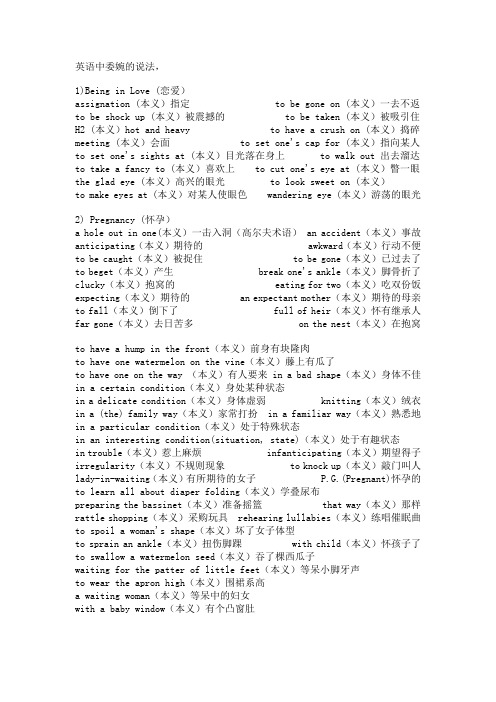
英语中委婉的说法,1)Being in Love (恋爱)assignation (本义)指定 to be gone on (本义)一去不返to be shock up (本义)被震撼的 to be taken (本义)被吸引住H2 (本义)hot and heavy to have a crush on (本义)捣碎meeting (本义)会面 to set one's cap for (本义)指向某人to set one's sights at (本义)目光落在身上 to walk out 出去溜达to take a fancy to (本义)喜欢上 to cut one's eye at (本义)瞥一眼the glad eye (本义)高兴的眼光 to look sweet on (本义)to make eyes at (本义)对某人使眼色 wandering eye (本义)游荡的眼光2) Pregnancy (怀孕)a hole out in one(本义)一击入洞(高尔夫术语) an accident(本义)事故anticipating(本义)期待的 awkward(本义)行动不便to be caught(本义)被捉住 to be gone(本义)已过去了to beget(本义)产生 break one's ankle(本义)脚骨折了clucky(本义)抱窝的 eating for two(本义)吃双份饭expecting(本义)期待的 an expectant mother(本义)期待的母亲to fall(本义)倒下了 full of heir(本义)怀有继承人far gone(本义)去日苦多 on the nest(本义)在抱窝to have a hump in the front(本义)前身有块隆肉to have one watermelon on the vine(本义)藤上有瓜了to have one on the way (本义)有人要来 in a bad shape(本义)身体不佳in a certain condition(本义)身处某种状态in a delicate condition(本义)身体虚弱 knitting(本义)绒衣in a (the) family way(本义)家常打扮 in a familiar way(本义)熟悉地in a particular condition(本义)处于特殊状态in an interesting condition(situation, state)(本义)处于有趣状态in trouble(本义)惹上麻烦 infanticipating(本义)期望得子irregularity(本义)不规则现象 to knock up(本义)敲门叫人lady-in-waiting(本义)有所期待的女子 P.G.(Pregnant)怀孕的to learn all about diaper folding(本义)学叠尿布preparing the bassinet(本义)准备摇篮 that way(本义)那样rattle shopping(本义)采购玩具 rehearing lullabies(本义)练唱催眠曲to spoil a woman's shape(本义)坏了女子体型to sprain an ankle(本义)扭伤脚踝 with child(本义)怀孩子了to swallow a watermelon seed(本义)吞了棵西瓜子waiting for the patter of little feet(本义)等呆小脚牙声to wear the apron high(本义)围裙系高a waiting woman(本义)等呆中的妇女with a baby window(本义)有个凸窗肚3)Defecation (如厕)to be caught short (本义)给了个冷不妨 to fix one's face (本义)化装the call of nature (本义)自然的需要 to freshen up (本义)梳洗打扮Can I add some powder? (本义)我可以茶点粉吗?to cash(write) a check (本义)兑(开)张支票 evacuation (本义)排空to do a job for oneself (本义)做点私事 to excrete (本义)排泄do one's business (本义)干自己的活 to do one's duty (本义)尽职to ease oneself (本义)自我轻松一下 to eliminate (本义)逐出to find a haven of rest (本义)寻找安息所to get some fresh air (本义)去呼吸一点新鲜空气to give oneself ease (本义)使自己舒服一下to go into retreat (本义)去僻静 to go somewhere (本义)出去一下to go to Egypt (本义)到埃及去 powder one's nose (本义)搽点粉to go to one's private office (本义)到私人办公室去May I adjourn? (本义)我可以变换一下地方吗?natural necessity (本义)自然的需要 nature stop (本义)自然需要停车to pluck a rose (本义)摘朵玫瑰 to relieve oneself (本义)轻松一下4)Death(死亡)to be asleep in the Arms of God (本义)安睡在上帝的怀中to be at peace (本义)平静了 to be at rest (本义)在休息to be called to God (本义)被召唤到上帝那 to rest (本义)休息to be called home (本义)被召回家 to depart (本义)离去to be home and free (本义)到家自由了 to go home (本义)回家to be taken to paradise (本义)被送进天堂 happy land (本义)乐土The call of God (本义)上帝的召唤 final sleep (本义)最后一觉The final departure (本义)最后离去 to go to heaven (本义)进天堂to go to one's long home (本义)回到永久之家 in heaven (本义)在天堂to go to one's own place (本义)回老家 to sleep (本义)长眠to have fallen asleep (本义)入睡了 to rest in peace (本义)安息to have found rest (本义)得到安息 to pay one's fee (本义)付费to have gone to a better place(land,world,life)到一个更好得地方去了to join one's ancestors (本义)加入先人的行列join the Great majority (本义)加入大多数 to fall (本义)倒下了to leave this world (本义)离开今世 to return to dust (本义)归之尘土with God (本义)和上帝在一起 with their Father (本义)与圣父在一起to do one's bit (本义)尽职了 to be out of pain (本义)摆脱痛苦to lay down one's life (本义)放下自己的生命 to expire (本义)呼气to be no longer with us (本义)不再与我们在一起to breathe one's last (本义)呼了最后一口气 to go off (本义)离去to cancel one's account (本义)销帐 to be gone (本义)去了pay one's last debt (本义)付最后一笔债 to fade away (本义)消失to make one's exit (本义)退场 to kick off (本义)开球to be free (本义)解脱了 to be no more (本义)不复存在to close one's eyes (本义)瞑目 to come to an end (本义)结束to go beyond (本义)到远方去 to go one's last (本义)走到自己的终点to go one's place (本义)回老家 to go to west (本义)西去to go to one's resting place (本义)到休息地去to kick the bucket (本义)踢翻水桶 to stop living (本义)停止生存to lose one's life (本义)失去了生命 to pass away (本义)离去to take one's rest (本义)休息 to shut up the shop (本义)关门英语构词法一. 常见的前缀1.表示否定意义的前缀1)纯否定前缀a-, an-, asymmetry(不对称)anhydrous(无水的)dis- dishonest, dislikein-, ig-, il, im, ir, incapable, inability, ignoble, impossible, immoral, illegal, irregularne-, n-, none, neither, never ;non-, noesense ; neg-, neglect un- unable, unemployment2)表示错误的意义male-, mal-, malfunction, maladjustment(失调)mis-, mistake, mislead ;pseudo-, pseudonym(假名), pseudoscience 3)表示反动作的意思de-, defend, demodulation(解调) ; dis-, disarm, disconnectun-, unload, uncover4)表示相反,相互对立意思anti-, ant- antiknock( 防震), antiforeign,(排外的)contra-, contre-, contro-, contradiction, controflow(逆流)counter-, counterreaction, counterbalanceob-, oc-, of-, op-, object, oppose, occupywith-, withdraw, withstand2. 表示空间位置,方向关系的前缀1)a- 表示“在……之上”,“向……”:aboard, aside,2)by- 表示“附近,邻近,边侧”:bypath, bypass(弯路)3)circum-, circu-, 表示“周围,环绕,回转”:circumstance, circuit4)de-, 表示“在下,向下”:descend, degrade5)en-, 表示“在内,进入”:encage, enbed(上床)6)ex-, ec-, es-, 表示“外部,外”:exit, eclipse, expand, export7)extra-, 表示“额外”:extraction (提取)8)fore- 表示“在前面”:forehead, foreground9)in-, il-, im-, ir-, 表示“向内,在内,背于”inland, invade, inside, import10)inter-, intel-, 表示“在……间,相互”international, interaction, internet11)intro-, 表示“向内,在内,内侧”:introduce, introduce12)medi-, med-, mid-, 表示“中,中间”:Mediterranean, midposition13)out-, 表示“在上面,在外部,在外”:outline, outside, outward14)over-, 表示“在上面,在外部,向上”:overlook, overhead, overboard15)post-, 表示"向后,在后边,次”:postscript(附言),16)pre-, 表示"在前”在前面”:prefix, preface, preposition17)pro-, 表示“在前,向前”:progress, proceed,18)sub-, suc-, suf-, sug-, sum-, sup-, sur-, sus-, 表示“在下面,下”subway, submarine, suffix, suppress, supplement19)super-, sur-, 表示“在…..之上”superficial, surface, superstructure20)trans-, 表示“移上,转上,在那一边”translate, transform, transoceanic21)under-, 表示“在…..下面,下的”:underline, underground, underwater22)up-, 表示“向上,向上面,在上”:upward, uphold, uphill(上坡)3. 表示时间,序列关系的前缀1)ante-, anti-, 表示“先前,早于,预先”:antecedent, anticipate,2)ex-, 表示“先,故,旧”:expresident, exhusband3)fore-, 表示“在前面,先前,前面”:foreward, dorecast, foretell(预言)4)mid-, medi-, 表示“中,中间”:midnight, midsummer5)post-"表示“在后,后”:postwar,6)pre-, pri-, 表示“在前,事先,预先”:preheat, prewar, prehistory7)pro-, 表示“在前,先,前”:prologue(序幕),prophet(预言家)8)re-, 表示“再一次,重新”:retell, rewrite4. 表示比较程度差别关系的前缀1)by-, 表示“副,次要的”:byproduct, bywork(副业)2)extra-,表示“超越,额外”:extraordinary,3)hyper- 表示“超过,极度”:hypersonic(超声波), hypertesion(高血压)4)out-,表示“超过,过分”:outdo(超过), outbid(出价过高的人)5)over-,表示“超过,过度,太”:overeat, overdress, oversleep6) sub-, suc-, sur-, 表示“低,次,副,亚”subeditor, subordinate, subtropical(亚热带)7)super-, sur- 表示“超过”:supernature, superpower, surplus, surpass8)under-,表示“低劣,低下”undersize, undergrown, underproduction(生产不足)9)vice- 表示“副,次”:vicepresident, vicechairman5. 表示共同,相等意思的前缀1)com-, cop-, con-, cor-, co- 表示“共同,一起”。
英语委婉语气表达法
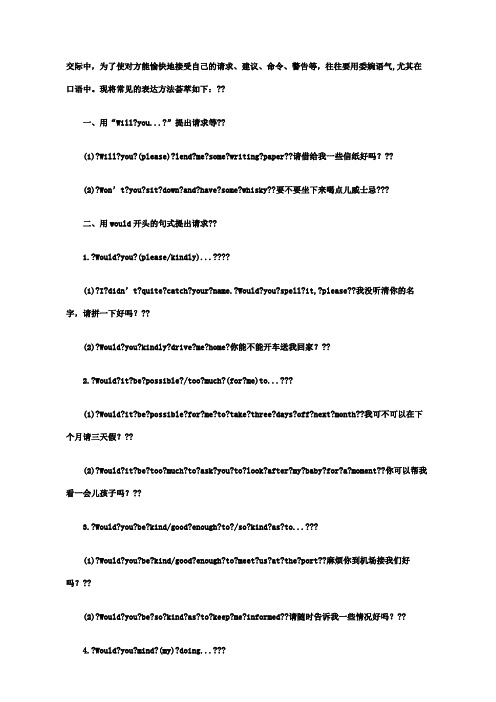
交际中,为了使对方能愉快地接受自己的请求、建议、命令、警告等,往往要用委婉语气,尤其在口语中。
现将常见的表达方法荟萃如下:??一、用“Will?you...?”提出请求等??(1)?Will?you?(please)?lend?me?some?writing?paper??请借给我一些信纸好吗???(2)?Won’t?you?sit?down?and?have?some?whisky??要不要坐下来喝点儿威士忌???二、用would开头的句式提出请求??1.?Would?you?(please/kindly)...????(1)?I?didn’t?quite?catch?your?name.?Would?you?spell?it,?please??我没听清你的名字,请拼一下好吗???(2)?Would?you?kindly?drive?me?home?你能不能开车送我回家???2.?Would?it?be?possible?/too?much?(for?me)to...???(1)?Would?it?be?possible?for?me?to?take?three?days?off?next?month??我可不可以在下个月请三天假???(2)?Would?it?be?too?much?to?ask?you?to?look?after?my?baby?for?a?moment??你可以帮我看一会儿孩子吗???3.?Would?you?be?kind/good?enough?to?/so?kind?as?to...???(1)?Would?you?be?kind/good?enough?to?meet?us?at?the?port??麻烦你到机场接我们好吗???(2)?Would?you?be?so?kind?as?to?keep?me?informed??请随时告诉我一些情况好吗???4.?Would?you?mind?(my)?doing...???Would?you?mind?my?turning?down?the?volume?of?the?television??你不介意我把电视声音关小点儿吧???5.?Would?you?mind?if?I?...???Would?you?mind?if?I?asked?you?a?question??我可以问你一个问题吗???三、shall用于第一人称和第三人称,构成疑问句,提出建议或征求对方意见??(1)?Shall?we?go?to?the?concert?tonight??我?们今晚去听音乐会好吗???(2)?Shall?she?come?at?once??要她马上来吗???四、用would,?should,?could,?might表示看法、提出建议或忠告等??(1)?It?would?seem?that?something?is?wrong?with?the?truck.?看来这部卡车出毛病了。
委婉表达的句子英语

委婉表达的句子英语1. 英语委婉语大全1.和死有关的委婉语不管在哪种文化中,人们普遍忌讳的词之一就是“死”。
当人们不得不提到它时,往往使用一些比较委婉、不那么刺耳的说法来代替。
于是,出现大量关于死的委婉语。
比如:to go to the heaven (上天堂去了);to go to a better world(到极乐世界去了):to go to another world (到另一个世界去了);to pay one's debt to nature (向大自然还债了);to pass away (去世了);to be gone (走了);to breathe one's last (咽气了);等等。
死对人们来说是一种不愉快的事情,用委婉语在陈述这一事实时多数用了比喻的手段,表达了人们的良好愿望,要去天堂,要去极乐世界。
另外,认为死是一种解脱,受完了罪还完了债,一切就了结了。
2.和疾病有关的委婉语死亡意味着向生者告别,是一件悲哀的事,然而和死亡相比,一些疾病也令人难过。
因此,直接谈论这些事往往被视为粗鲁和没礼貌。
艾滋病在西方社会已变成一种非常普通的疾病而又苦于没有治愈方法和控制的有效措施,人们谈之色变而避之不及,因此艾滋病被冠以社会疾病(social disease)。
对难以医治的癌症(cancer)人们称之为绝症(terminal illness)或仅用字母C 来替代。
其他疾病如麻风病(leprosy)被称为Hansen's disease;肺结核(tuberculosis )成了 T.B;狐臭(body odor)被称为 B.O;变秘(constipation)被称为紊乱(irregularity);唑疮(acne)被称为问题皮肤(problem skin)。
而其它的性病(veneral disease)人们用V.D.来代替。
如果一个人疯了,就称他脑子有问题(soft in head),或是不在状态(not all there)。
英语委婉语
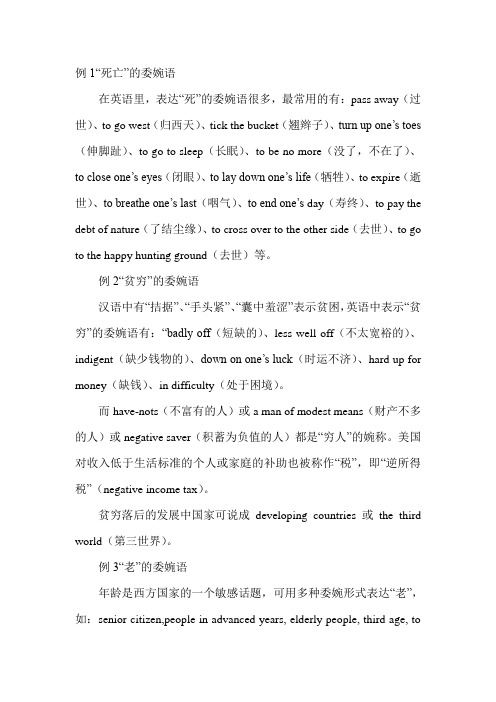
例1“死亡”的委婉语在英语里,表达“死”的委婉语很多,最常用的有:pass away(过世)、to go west(归西天)、tick the bucket(翘辫子)、turn up one’s toes (伸脚趾)、to go to sleep(长眠)、to be no more(没了,不在了)、to close one’s eyes(闭眼)、to lay down one’s life(牺牲)、to expire(逝世)、to breathe one’s last(咽气)、to end one’s day(寿终)、to pay the debt of nature(了结尘缘)、to cross over to the other side(去世)、to go to the happy hunting ground(去世)等。
例2“贫穷”的委婉语汉语中有“拮据”、“手头紧”、“囊中羞涩”表示贫困,英语中表示“贫穷”的委婉语有:“badly off(短缺的)、less well off(不太宽裕的)、indigent(缺少钱物的)、down on one’s luck(时运不济)、hard up for money(缺钱)、in difficulty(处于困境)。
而have-nots(不富有的人)或a man of modest means(财产不多的人)或negative saver(积蓄为负值的人)都是“穷人”的婉称。
美国对收入低于生活标准的个人或家庭的补助也被称作“税”,即“逆所得税”(negative income tax)。
贫穷落后的发展中国家可说成developing countries或the third world(第三世界)。
例3“老”的委婉语年龄是西方国家的一个敏感话题,可用多种委婉形式表达“老”,如:senior citizen,people in advanced years, elderly people, third age, tofeel one’s age, mature等。
英语里面的委婉语
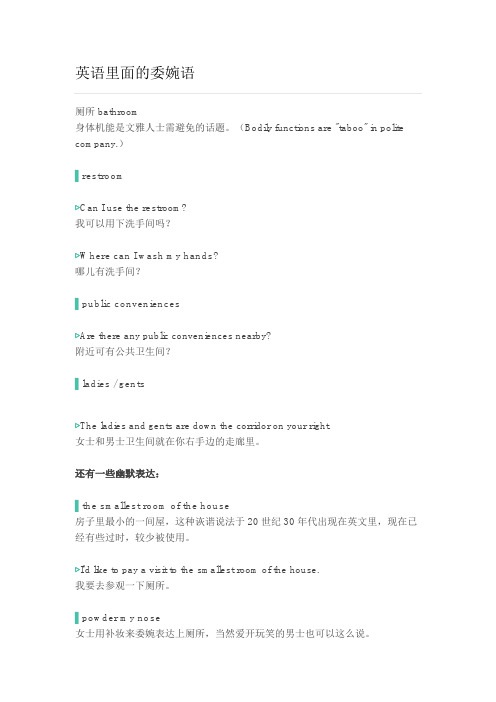
厕所 bathroom身体机能是文雅人士需避免的话题。
(Bodily functions are "taboo" in polite company.)▌restroom▷Can I use the restroom?我可以用下洗手间吗?▷Where can I wash my hands?哪儿有洗手间?▌public conveniences▷Are there any public conveniences nearby?附近可有公共卫生间?▌ladies / gents▷The ladies and gents are down the corridor on your right.女士和男士卫生间就在你右手边的走廊里。
还有一些幽默表达:▌the smallest room of the house房子里最小的一间屋,这种诙谐说法于20世纪30年代出现在英文里,现在已经有些过时,较少被使用。
▷I'd like to pay a visit to the smallest room of the house.我要去参观一下厕所。
▌powder my nose女士用补妆来委婉表达上厕所,当然爱开玩笑的男士也可以这么说。
▷Where can I powder my nose?我上哪儿能补个粉?▌see a man about a dog这种说法原始意思是指为赛马或者赛狗下注,后来通常作为离开或缺席的借口。
原因通常是去上厕所,或者买酒。
▷He's gone to see a man about a dog.他去方便了。
失业unemployment▌between jobs在前一个和后一个工作之间,也就是待业啦。
▷Interviewer: Tell me about your current position.面试官:请告诉我你目前的职位。
▷Job candidate: I'm between jobs right now.求职者:我目前暂时待业。
英语委婉语的例子
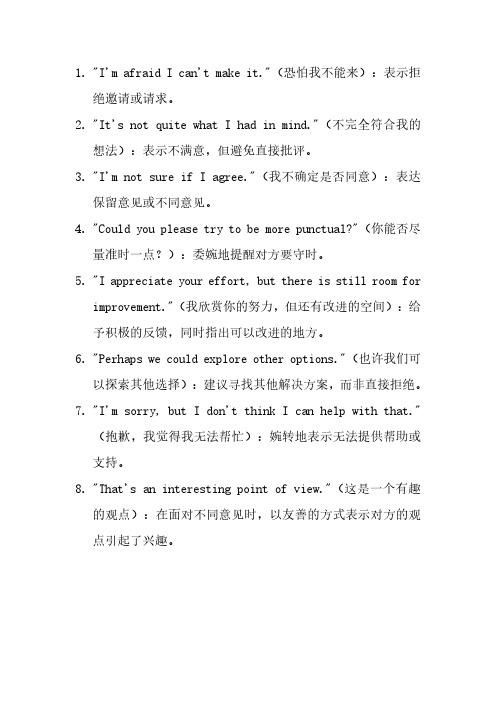
1."I'm afraid I can't make it."(恐怕我不能来):表示拒
绝邀请或请求。
2."It's not quite what I had in mind."(不完全符合我的
想法):表示不满意,但避免直接批评。
3."I'm not sure if I agree."(我不确定是否同意):表达
保留意见或不同意见。
4."Could you please try to be more punctual?"(你能否尽
量准时一点?):委婉地提醒对方要守时。
5."I appreciate your effort,but there is still room for
improvement."(我欣赏你的努力,但还有改进的空间):给予积极的反馈,同时指出可以改进的地方。
6."Perhaps we could explore other options."(也许我们可
以探索其他选择):建议寻找其他解决方案,而非直接拒绝。
7."I'm sorry,but I don't think I can help with that."
(抱歉,我觉得我无法帮忙):婉转地表示无法提供帮助或支持。
8."That's an interesting point of view."(这是一个有趣
的观点):在面对不同意见时,以友善的方式表示对方的观点引起了兴趣。
英语中的委婉语

英语中的委婉语(总8页)--本页仅作为文档封面,使用时请直接删除即可----内页可以根据需求调整合适字体及大小--英语中的委婉语委婉来自希腊语,eu 是好的意思,phemism 是speech (言语)的意思,整个字面的意思是word of good omen (吉祥)或好的说法。
一般认为,凡是表示禁忌或敏感事物的含蓄、迂回或动听的语言,均属委婉语。
由此可知,委婉语不仅是人们交际的需要,更是言语交际中维系人们社会关系和人际关系的重要手段。
随着社会的进步,人类文明的发展,委婉语始终伴随着整个社会的言语交际过程,且表现出极强的言语交际功能。
由于委婉语在英语中应用比较广泛,所以了解委婉语的交际功能对于我们学好英语、进行有效的跨文化交际有很大帮助。
本文从社会语言学的角度,试图通过具体的语言实例,探究在特定的语言环境下英语委婉语的交际功能。
一、委婉语的“避讳”功能语言禁忌起源于古希腊,古罗马时期人们对神的敬畏。
在人类文明的早期,科学尚不发达,人们对一些自然现象还不能认识和解释,对人的自身也认识不足,常常因感某种神秘力量而内心深怀恐惧,在口头语言表达上为一种不愿言、不敢言,久而久之就成为一种语言的禁忌,但因相互交流的需要,有时又不得不表达出此种意思,于是人们逐渐学会了用避讳的话委婉地表达;委婉语也因而产生,并被广泛应用。
这样,避讳禁忌、消除恐惧便成了委婉语的第一功能。
例如Satan 被称为the good man,the great fellow ,Devil 被称为the Big D 及Lord of the Flies. 人们对“死亡”的恐惧必然导致大量有关“死亡”的委婉语的产生。
讲英语国家的人们和许多其他民族的人民一样,忌讳直接说“死”(to die)字,创造了很多表达“死”的意思的委婉语。
例如,人们常用“去了”(to pass away),“离别了”(to depart),“离开了我们”(to leave us),“睡着了”(to go to sleep),“去天国”(to go to heaven),“心脏停止了跳动”(one’s heart has stopped beating),等词来代替说某人“死了”(to die),因为“死”太神秘、太痛苦、太让人恐怖了。
英语委婉语气表达法
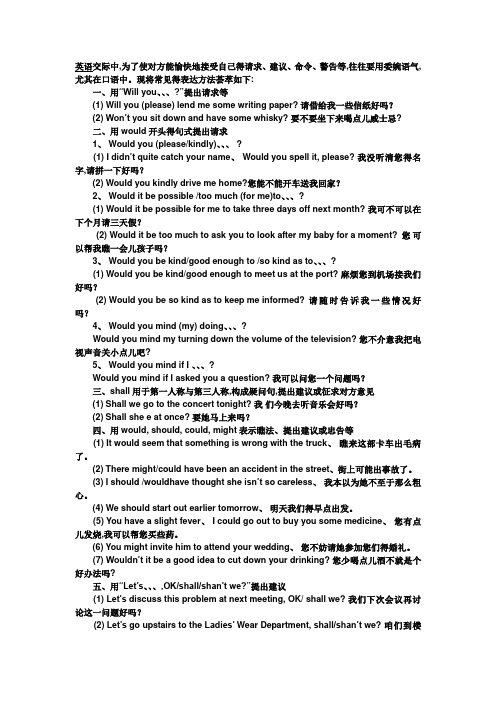
英语交际中,为了使对方能愉快地接受自己得请求、建议、命令、警告等,往往要用委婉语气,尤其在口语中。
现将常见得表达方法荟萃如下:一、用“Will you、、、?”提出请求等(1) Will you (please) lend me some writing paper? 请借给我一些信纸好吗?(2) Won’t you sit down and have some whisky? 要不要坐下来喝点儿威士忌?二、用would开头得句式提出请求1、 Would you (please/kindly)、、、 ?(1) I didn’t quite catch your name、 Would you spell it, please? 我没听清您得名字,请拼一下好吗?(2) Would you kindly drive me home?您能不能开车送我回家?2、 Would it be possible /too much (for me)to、、、?(1) Would it be possible for me to take three days off next month? 我可不可以在下个月请三天假?(2) Would it be too much to ask you to look after my baby for a moment? 您可以帮我瞧一会儿孩子吗?3、 Would you be kind/good enough to /so kind as to、、、?(1) Would you be kind/good enough to meet us at the port? 麻烦您到机场接我们好吗?(2) Would you be so kind as to keep me informed? 请随时告诉我一些情况好吗?4、 Would you mind (my) doing、、、?Would you mind my turning down the volume of the television? 您不介意我把电视声音关小点儿吧?5、 Would you mind if I 、、、?Would you mind if I asked you a question? 我可以问您一个问题吗?三、shall用于第一人称与第三人称,构成疑问句,提出建议或征求对方意见(1) Shall we go to the concert tonight? 我们今晚去听音乐会好吗?(2) Shall she e at once? 要她马上来吗?四、用would, should, could, might表示瞧法、提出建议或忠告等(1) It would seem that something is wrong with the truck、瞧来这部卡车出毛病了。
英语委婉语气表达法

英语交际中,为了使对方能愉快地接受自己得请求、建议、命令、警告等,往往要用委婉语气,尤其在口语中。
现将常见得表达方法荟萃如下:一、用“Will you。
、。
?”提出请求等ﻫ(1) Will you (please) lend me some writing paper?请借给我一些信纸好不?ﻫ(2) Won’t you sit down and have some whisky?要不要坐下来喝点儿威士忌?二、用would开头得句式提出请求1。
Would you (please/kindly).。
、?ﻫ(1) I didn’t quite catch you r name. Would you spell it, please?我没听清您得名字,请拼一下好不?(2) Would you kindly drive me home?您能不能开车送我回家?2、 Would it be possible /too much (for me)to。
.。
?ﻫ(1) Would it be possible for me to take three days off nextmonth? 我可不可以在下个月请三天假? ﻫ(2) Would it be toomuch to ask you to look after m ybaby for a moment?您可以帮我瞧一会儿孩子不?3、 Would you be kind/good enough to /so kind as to。
.、? ﻫ(1) Woul d you be kind/good enough to meet us at the port? 麻烦您到机场接我们好不?(2) Would you be so kindas to keep meinformed?请随时告诉我一些情况好不?4。
Would you mind (my) doing.、、?Would you mindmy turning down the volume of the television? 您不介意我把电视声音关小点儿吧? 5 ﻫ、 Would you mind if I 、。
英语委婉语气表达法

英语委婉语气表达法英语交际中,为了使对方能愉快地接受自己的请求、建议、命令、警告等,往往要用委婉语气,尤其在口语中。
现将常见的表达方法荟萃如下:一、用“Will you...”提出请求等(1) Will you (please) lend me some writing paper 请借给我一些信纸好吗(2) Won’t you sit down and have some whisky 要不要坐下来喝点儿威士忌二、用would开头的句式提出请求1. Would you (please/kindly)...(1) I didn’t quite catch your name. Would you spell it, please 我没听清你的名字,请拼一下好吗(2) Would you kindly drive me home你能不能开车送我回家2. Would it be possible /too much (for me)to...(1) Would it be possible for me to take three days off next month 我可不可以在下个月请三天假(2) Would it be too much to ask you to look after my baby for a moment 你可以帮我看一会儿孩子吗3. Would you be kind/good enough to /so kind as to...(1) Would you be kind/good enough to meet us at the port 麻烦你到机场接我们好吗(2) Would you be so kind as to keep me informed 请随时告诉我一些情况好吗4. Would you mind (my) doing...Would you mind my turning down the volume of the television 你不介意我把电视声音关小点儿吧5. Would you mind if I ...Would you mind if I asked you a question 我可以问你一个问题吗三、shall用于第一人称和第三人称,构成疑问句,提出建议或征求对方意见(1) Shall we go to the concert tonight 我们今晚去听音乐会好吗(2) Shall she come at once 要她马上来吗四、用would, should, could, might表示看法、提出建议或忠告等(1) It would seem that something is wrong with the truck. 看来这部卡车出毛病了。
- 1、下载文档前请自行甄别文档内容的完整性,平台不提供额外的编辑、内容补充、找答案等附加服务。
- 2、"仅部分预览"的文档,不可在线预览部分如存在完整性等问题,可反馈申请退款(可完整预览的文档不适用该条件!)。
- 3、如文档侵犯您的权益,请联系客服反馈,我们会尽快为您处理(人工客服工作时间:9:00-18:30)。
英语委婉语的例子30个
1. "I'm afraid I have to decline your invitation." (拒绝邀请)
2. "It's not quite what I had in mind." (不是我的想法)
3. "I'm not sure if I can make it." (不确定我能否参加)
4. "I'm sorry, but I have other commitments." (我很抱歉,但我有其他约定)
5. "Perhaps we can revisit this at a later time?" (也许我们可以稍后再考虑这个问题?)
6. "I think I need to pass on this opportunity." (我认为我需要放弃这个机会)
7. "I don't feel comfortable discussing this." (我不觉得讨论这个话题舒服)
8. "I'm not really interested in pursuing this further." (我真的不太想再深入探讨这个问题)
9. "It's not exactly what I had in mind." (并不完全符合我的想法)
10. "I appreciate your offer, but I think I'll have to decline." (谢谢你的提议,但我想我必须拒绝)
11. "I'm not sure if I'm the best person for the job." (我不确定我是否是最适合的人选)
12. "I think I'll have to pass on this one." (我想我得拒绝这个)
13. "I regret to say that I won't be able to attend." (很遗憾,我不能参加)
14. "I'm not really comfortable with this situation." (我对这种情况并不感到舒适)
15. "I'm afraid I can't help you with that." (很抱歉,我无法帮你处理这个)
16. "I'm not quite ready to commit to that yet." (我还没准备好承诺)
17. "I'm not sure that's the best approach." (我不确定那是最好的方法)
18. "I don't think this is a good fit for me." (我觉得这不适合我)
19. "I'm sorry, I can't make it." (对不起,我不能来)
20. "I'd rather not discuss that." (我宁愿不讨论那个)
21. "I'm not really looking for a change at the moment." (我现在并不是真的想要改变)
22. "I don't think that's a good idea." (我不认为那是个好主意)
23. "I'm afraid I have to disagree with you on that." (恐怕我必须在这个问题上与你不同意)
24. "I may have to decline this offer." (我可能不得不拒绝这个提议)
25. "I'm afraid I can't commit to that right now." (我恐怕现在不能承诺)
26. "I'm not really comfortable with the terms." (我不太满意这些条款)
27. "I'm afraid I don't have the time for that." (恐怕我没有时间做那个)
28. "I don't think that's quite what I had in mind." (我认为那不是我想要的)
29. "I'm not really sure what to think about this." (我不是很确定怎么看待这个)
30. "I'm afraid I can't provide you with what you're asking for." (恐怕我不能提供你所要求的东西)。
